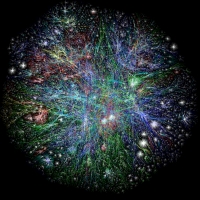
 |
Ethno::log |
|
... Previous page
What defines online communities? 12 Variables to understand online communities. "This article is an attempt to discuss some of the qualities that define virtual communities." ... Link (1 comment) ... Comment Dept. of ethnologica, kerleone, December 9, 2003 at 12:23:07 PM CET
... Link (0 comments) ... Comment Dept. of Publications, kerleone, December 9, 2003 at 12:05:26 PM CET Representations of the Others The following PDF-Publication discusses the Representation of Others in a wide field of different encounters: Between "disembodied male readers encountering fictional females to World Fair visitors observing the ?primitive?, Swedish travellers writing about Palestinians, Western newspapers conceptualising Afghanistan, Russian intellectuals meeting the masses, and web-site tourists visiting the Baltic." Hurd, Madeleine: Encounters. Representations of the Others in Modern European History. Huddinge : Södertörns Högskola, 2003. publications.uu.se (9 Dez. 2003). ... Link (2 comments) ... Comment Dept. of events, Okyeampoma, December 6, 2003 at 6:26:10 PM CET 'Ethnology & Tourism' - conference programme  Last info for coming Friday's Conference on 'Ethnology & Tourism' in München - have a look at the updated conference programme
(application/msword, 118 KB)
.
What an event...!! Congrats.
Last info for coming Friday's Conference on 'Ethnology & Tourism' in München - have a look at the updated conference programme
(application/msword, 118 KB)
.
What an event...!! Congrats.
[zeph:] To avoid misunderstandings: The event hasn't taken place yet, but WILL take place next Friday, 12th December 2003. And the program is online as well ;o) ... Link (1 comment) ... Comment Dept. of tech. adaption, kerleone, December 4, 2003 at 6:37:28 PM CET Intel and the Anthropologists At brandeins.de I found a very interesting article (german only, sorry) about Intel working with Anthropologists and other social scientist. They employ them to discover the cultural differences in the use of technology, and the different needs of cultures concerning technologies. Interesting example is, that in Malaysia people prefer to have the direction of Mekka in the display of their cell phone. This is whole topic "adaption of technology", in special semiconductor technology, is not only a very interesting field, it seems its also a field where you can actually earn money as anthropologist. It's glad to see that major, international companies discovered that they have to adapt the products to the differentcultures, and not (only?) the cultures to their products (as with advertising, for which they spend much more money). Thanks, Seewolf, for pointing me to the article ... Link (2 comments) ... Comment Dept. of thoughts, kerleone, December 2, 2003 at 7:41:38 PM CET Invention of Tradition and "the other" I was recently arguing about the United States and their lack of a long term history, which distinguishes them from other states and ethnic groups. But I have to start from the beginning of my thought. There's a term in anthropology, "invention of tradition" which was introduced twenty or thirty years ago and describes the fact, that in many states tradition and history was "invented". For example, the idea of the Indian caste was a concept build in colonial India by the British, but the society stated it to be older (correct me if I am wrong with this example)(1)(The first book dealing with this idea was Hobsbawm, E. and Ranger, T (Eds.): The Invention of Tradition. Cambridge : Cambridge University Press, 1983) . First of all, this invention of tradition, or at least its constant redefinition, is not only bad. It could enable communities to change themselves, without "officially" changing its values. Change without a revolution. In many ethnic groups we have those kind of movements, with refer to a time so far away, not exactly being present in the common memory of a society anymore. Its so far away that the community could interpret and define those traditions in a new way, while still keeping the basic ideas of its self identity. My argument now was this. The United States lack this kind of "old enough history". Or in other words, the one they have, is not suitable for most Americans. And because of that their own steady definition of "itself" as a nation is not able to rely on this "old enough history". They have to define themselves by defining "the other". But this definition of the self by the outer world instead of the inner world probably is one source for the constant confrontation with other states. Well, this was my argument. Now, as I wrote it down, it seems rather simplifying. But maybe it has still a true point. Another question I have is if I borrowed this argument from another debate. Is this a common claim, that the Americans have to define themselves by the "other" because of their lack of free interpretable, "old enough history"? ... Link (6 comments) ... Comment Dept. of localica, kerleone, December 2, 2003 at 7:38:00 PM CET Using Footnotes in Ethno::Log After writing by short description of how to use modern footnotes in scientific online publications (as reported earlier) I decided that it would quite practicable to use this also in this weblog, as you can hide some parts of long articles or the bibliographic information. (Try it out) But, well it was only some quick hack, so use it if you wan't and don't use it if you don't like it. There's no rule to make articles short. How to use it? Take a look at "add a story", it's quite self explanatory. But theres no automatic numbering, you can define the text of the footnote-anchor by yourself (just as above). The standard is (1)(nothing more to read here). If nothing is happening or the red text is visible right after loading the page, leave a comment please. Or try updating your browser. ... Link (1 comment) ... Comment Dept. of tools, warauduati, December 2, 2003 at 3:16:05 PM CET Etymology - the history of words Just found this page Etymologie, Étymologie, Etymology - Wortgeschichten, des histoires autour des mots, the history of words by surfing for information on a totally different subject ... but it seems to be quite interesting in regards to anyone who wants to know about the origin and history of words... maybe someone with time can check it out and reply !!! ... Link (0 comments) ... Comment Dept. of cyberethnologica, zephyrin, December 1, 2003 at 1:32:51 PM CET Psychology of cyberspace
... Link (0 comments) ... Comment Dept. of cyberethnologica, zephyrin, December 1, 2003 at 12:08:02 PM CET Map of the Internet  The Opte project "was created to make a visual representation of a space that is very much one-dimensional, a metaphysical universe. The data represented and collected here serves a multitude of purposes: Modeling the Internet, analyzing wasted IP space, IP space distribution, detecting the result of natural disasters, weather, war, and esthetics/art. This project is free and represents a lot of donated time, please enjoy." While reading a discussion at slashdot about this, I stumbled over the IP Address Locator Tool -- finally a means for online-researchers to correlate the members of 'their cyberian tribes' to geographic space. I wonder how this goes with ethics and online research.
via infocult
The Opte project "was created to make a visual representation of a space that is very much one-dimensional, a metaphysical universe. The data represented and collected here serves a multitude of purposes: Modeling the Internet, analyzing wasted IP space, IP space distribution, detecting the result of natural disasters, weather, war, and esthetics/art. This project is free and represents a lot of donated time, please enjoy." While reading a discussion at slashdot about this, I stumbled over the IP Address Locator Tool -- finally a means for online-researchers to correlate the members of 'their cyberian tribes' to geographic space. I wonder how this goes with ethics and online research.
via infocult
... Link (0 comments) ... Comment Dept. of , Okyeampoma, November 27, 2003 at 11:49:10 AM CET ETHNOFEST!! - Do. 4.12. im Substanz
... Link (9 comments) ... Comment Dept. of tools, kerleone, November 26, 2003 at 10:39:16 AM CET Modern Footnotes in Online Publications I recently published a short article about how to publish footnotes in online publications more convenient. I came up with a solution, which shows the additional text in the same line, if the footnote is clicked. This is far more convenient for the programmer and for the reader, as I think. The article is german, but html-experienced will still understand by looking at the code and the given examples in the grey boxes. ... Link (0 comments) ... Comment ... Next page
|
The finest stuff from ethnology social/cultural anthropology and cyberanthropology. Collected with ceaseless endeavour by students and staff of the Institut für Ethnologie in München/Germany and countless others.
... about this website Online for 8943 days Last modified: 11/29/22, 8:56 PM Search
Browse by Category
Status
Youre not logged in ... Login
Menu
Calendar
Recent updates
Schade Oh, so bad! The
oldest anthropology blog is closing :(( It seems the whole...
by iglu01 (1/4/20, 4:05 PM)
-- Closed -- I think
it's time to close the weblog, it's already sleeping since...
by kerleone (12/29/19, 1:54 PM)
Stellenausschreibung des Max-Planck-Instituts für ethnologische
Forschung. Bewerbungsfrist: 15.02.2017 Das Max-Planck-Institut für ethnologische Forschung sucht Doktoranden/Doktorandinnen...
by HatEl (1/31/17, 9:11 AM)
Ethnosymposium in Halle (Saale): Call
for Contribution – 14.-17. Mai 2015 Call for Contribution –...
by normanschraepel (2/9/15, 3:35 PM)
Bruno Latour: Kosmokoloss. Eine Tragikomödie
über das Klima Der Hörspiel Pool von Bayern 2 hat...
by pietzler (11/21/14, 3:23 PM)
Send us suggestions
|
||||||||||||||||||||||||||||||||||||||||||||||||||||||||